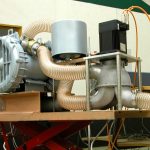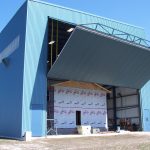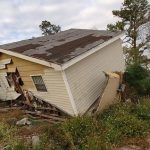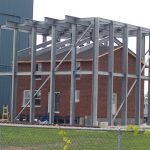Masters of the Storm
Motor Technology has supplied the drives and motors that operate critical components within a huge wind simulator capable of recreating the conditions of a category five hurricane. Motor Technology worked with Cambridge Consultants who designed a unique wind simulation system for The University of Western Ontario, in Canada, for use in their pioneering research into wind damage to domestic housing, known as the Three Little Pigs project.
The vast simulator was designed to operate within the Insurance Research Lab for Better Homes, a facility big enough for a full size house to be tested. The idea was to recreate severe wind conditions and monitor their affects on the structural integrity of complete buildings to the point of destruction.
The unique system designed by Cambridge Consultants involves a series of 100 pressure loading actuators, which are mounted against the walls and roof of the structure to be tested. Within each actuator is a rapid acting valve system that allows the simulation of wind pressures, with rates of change up to seven times a second. Each actuator is linked to a sophisticated control system that recreates the complex, rapidly changing pressures that would occur in a real storm, across the entire surface of the house.
Motor Technology supplied a motor and drive solution for each of the actuators, which would be capable of delivering the rapid pressure changes. Despite the high performance required Cambridge Consultants specified a low power consumption requirement because during the test cycles all 100 drives and motors would be operating at the same time.
To achieve this Motor Technology’s team designed a custom brushless servo motor, providing 12Nm at 1,000rpm, in a direct drive configuration to eliminate power losses of around 4% from a gearbox. By doing this the team were able to reduce current requirement by 15%, achieving a power saving of 40Amps across all 100 drives.
By utilizing the flexibility of a Metronix servo drive the team were able to use the standard resolver in the servo drive as an absolute feedback device. This eliminated the need for separate encoders and made a huge cost saving for the project. Additionally Metronix expanded the Ethernet capability of the drives to enable full control over Ethernet. This included full control over the control loops, power stage, and positioning control, etc.
Thanks to the elimination of unnecessary components such as the gearboxes and encoders each drive system is completely maintenance free and all drive/motor packages have operated perfectly since installation. The data collected by researchers working on the Three Little Pigs project will enable them to better understand the behaviour of domestic housing during storm conditions. In the long term this will enable improved building techniques and materials in areas where destructive storms are common.
First published – MAY 2009




